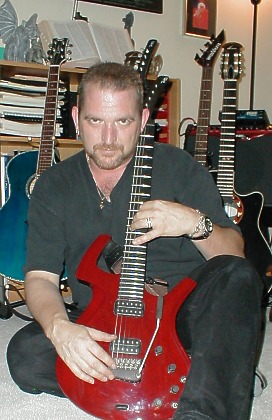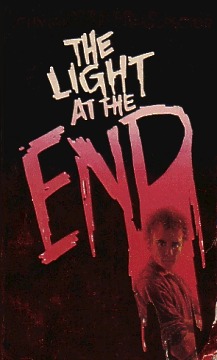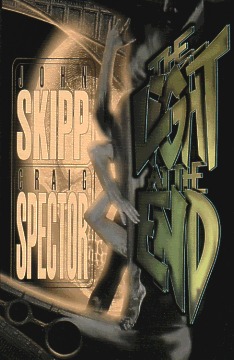"You're never gonna be normal, you're never gonna belong. You're always gonna be the twisted psychotic monster that nobody really realizes you are."
- Craig Spector
Craig Spector along with his former writing partner John Skipp, created some of the most inspiring and chilling horror of the 1980s. This culminated in the release of their screenplay, A NIGHTMARE ON ELM STREET 5: The Dream Child. This movie was an origin film, attempting to hark back to the original A Nightmare On Elm Street instead of the hack and slash teen body count garbage the series had become. Craig and John have parted ways and in November 2000, Craig will be releasing his first mass market solo book TO BURY THE DEAD (reviewed here by Julie Morales). Paul Wargelin, our Horror Movie reviewer here at Feo Amante, has reviewed every one of the Nightmare movies for us. He is also a big fan of Craig Spector, so who better to interview Craig?
Craig Spector speaks candidly to Feo Amante's Horror Home Page about his first solo novel, To Bury the Dead, his new publishing venture, Stealth Press, and writing for Hollywood. He also shares his thoughts on the future of the publishing industry as a whole, as well as personal tragedy and real life horror.
". . . when I was a child I was plagued with nightmares,"

Before Craig became a writer, he
was a musician. |
Paul V. Wargelin: When did you first decide that you wanted to write for publication?
Craig Spector: That was a complete accident. I literally had one of those weird experiences where up until I was about 22 years old, I knew exactly what I thought I was going to do, and what I thought my destiny was. It did not feature being a writer. I had absolutely no plans whatsoever of being a professional writer.
I was about to graduate from the Berklee College of Music, and I was planning on being a professional musician. I had this weird idea about a vampire in the subways. At that time I was in Boston and John Skipp was in New York, playing in bands and trying to be a writer. John and I had been friends since highschool in York, Pennsylvania, playing in bands together and just generally being wierd. He had sold a couple of stories to Twilight Zone. I called him up one day and said I got this great idea for a short story, why don't we write it and sell it to Twilight Zone and make a couple of hundred bucks. I bugged him mercilessly for about six months and I think he finally agreed to do it just to make me go away.
I graduated with a Bachelor's Degree with Honors, moved to New York and became a street messenger, which is always a good career move for somebody with a college degree. I worked for a couple of years and played in rock 'n' roll bands at night, and John and I wrote the book. Actually being a messenger became central to the book because as we were writing it I realized, who would hunt for a vampire? Messengers. Who else is crazy enough to figure it out? And of course this was in the era before everybody and their brother had a cell phone.
PVW: Were you a bicycle messenger or a roller skating messenger?
Craig Spector: So far as I'm aware I was the first roller skating messenger in New York City. All I can base that on is that I was out there every day doing twenty miles a day of combat skating for two years and never saw another one, until we actually sold the book. It was the next to my last day when I glanced up Broadway and saw another one going by.
It helped sell the book. It's become almost apocryphal at this point. I delivered the manuscript as a messenger run to Lou Aronica. I got past the receptionist who's trained to turn away unrepresented writers with unsolicited manuscripts. However, it's part of their job to accept anything a messenger gives them. I wrote it up on my manifest and delivered it as a messenger run.
Bantam called one day and they wanted to buy the book. Of course back then they wanted more than one book; at that time publishers were interested in actually building relationships with authors. They wanted to know if we had any other ideas, so we sat down the night before and mapped out ideas for five more books of all these ideas we had. It was a color-coded graph, it was the most absurd thing you've ever seen: a five-year timeline of projects, ancillary albums and movies. For sheer driven, youthful naivete, I don't think they'd ever seen anything quite like it.
We sat down with Lou and his assistant and we talked about the book, and Lou asked if we had any other ideas. We whipped out this graph and started pitching like crazy. About twenty minutes into it he excused himself and told the receptionist to hold his calls for the rest of the day. The books we pitched that day became the first five Skipp & Spector books.
PVW: So you "accidentally" became a writer?

Original book cover |

New Book cover |
Craig Spector: Yes and no. I had never planned on any of this. The Light at the End was just this weird mutant thing. It was fun. John was the one who was going to be a writer. I was going to go off and be a musician. And when they wanted to make a deal, not just for this book but more books, I thought well, it beats being a street messenger. There was this unbelievable doorway open to me, but with it I'm thinking to myself after we signed that deal for the first two books, I have exactly one year to become this thing or I'm just going to be the biggest jerk in the universe.
In retrospect, this many years later, I can look at it and think I guess that's how destiny works. It can kind of blindside you sometimes, cause at this point I can't imagine not doing this. It took me until I was 23 years old to discover this hitherto unknown part of myself. It didn't effortlessly fall into place. It's scary when one day you're doing this, especially in the hierarchy of New York and publishing - one week these very same people necessarily wouldn't trust me to carry an envelope from 55th Street to 34th Street, and the next they're like, "love your book."
PVW: So The Light at the End was your first published story?
Craig Spector: The Light at the End was my first published anything. I had written exactly one short story half as a joke in high school, and then there was The Light at the End. I later sold that joke story.
"I turned a personality defect into a career skill, which I think is not a bad idea."
PVW: Why write horror?
Craig Spector: Why not horror? The simplest explanation I can come up with for myself is I just seem to be tuned to the darker frequencies. I look out at the world and see something that is beautiful and ghastly at the same time. I see this beauty and this pathos and this absolute fucking horror, and it's all co-existing simultaneously - the greater and the lesser angels of our natures and that's always intrigued me. It just took me twenty years to put it in a thing that other people can understand. I was always just weird relative to most people I knew, then suddenly I went from just being weird to being a trained professional. I turned a personality defect into a career skill, which I think is not a bad idea.
But we all have that magical, mutant weirdness within us. Whenever someone says to me "I wish I was normal," I think "do you know anyone who's normal?" I've never met a normal person. We're all twisted in some way. That's one of the things that appeals to me about horror. Horror is one of the most direct connections to that in literature. It's one of the places in the modern world where myths as we understand them can still function in a modern form, where myths are alive as opposed to dusty old things that belong to ancient cultures. In ancient cultures they were alive and visceral and they were a way of explaining things.
And when it's done well, I think that's what horror still does. However, when you get to a point where it becomes a box, and a ghetto, and a genre, that's the point where I start losing interest. I'm interested in things that aren't just scary but intense, intense emotional states. The struggle between, are we going to make our lives something good or are we just going to destroy ourselves bit by bit?
"We're all bent."
My advice to anybody is to stop worrying about being normal. Become the mutant that you are. Use it to your advantage. Use it for a better purpose rather than a lesser purpose. You're never gonna be normal, you're never gonna belong. You're always gonna be the twisted psychotic monster that nobody really realizes you are. We're all bent. The sooner that we come to terms with that, the better off we stand a chance of being. That's as good as it's going to get. All hope of normalcy fled me years ago. But I'm comfortable with that. I'm just a natural born troublemaker. I just like to mix things up. Not for no purpose, but because I see so many rich targets, and I can't help myself. I'll never run out of things to whack on. The ironic thing is that when I want to get scared I don't tune in Friday the 13th Part 18, I turn on the news. And if I want to get philosophical about it, I flip on the History Channel. It's always been like this. I get my daily dose of fear on 24/7 live cable feeds of the news programs. I just watch this zeitgeist streaming out of control. Pardon me while I go back to stocking up my bunker. We're an insane species. But if you notice something that nobody else seems to get, and you wonder why doesn't anyone else see it this way, maybe you're here to explain it to them or tell them what you see. So do it.
 |
PVW: Speaking of genre, would you explain the Splatterpunk movement and your relationship to it?
Craig Spector: At this point, it's pretty much ancient history, and kind of like the Satanic Mousketeers. When it was happening and it was new to everybody, part of our collective shtick was "it's an attitude, it's a state of mind, its just a phase we're going through." It was all the above. It wasn't like anybody sat around and said "let's create a movement and we'll have a secret handshake." It was a spontaneous thing that began happening in the mid-1980s. There were a handful of writers, wholly independent of each other, who came about at the same time. Because it's a fairly small industry, or subset of the industry, we got to know each other, and we liked each other's work and liked hanging out with each other.
We were sitting around in a bar at a convention one night, drinking and joking about how everything being what it is, somebody's going to slap a label on us. At that time it was the heyday of Cyberpunk, and the buzz words of the day seemed to be "blank-slash-punk." We were just sitting around, throwing things out and finally it was Dave Schow who first put the combination together and went "Splatterpunk!" Everyone went yeah, and we all toasted to it. The next thing we knew, we'd given the media a hook, and now everybody wanted to talk about this. It was all a game. What got lost in the shuffle was that the work was serious, but the name wasn't.
So we got a name, and it was fun for a while. Then everyone started positioning themselves for or against it. And after a while it stopped being fun because everyone forgot that this wasn't supposed to be taken seriously, and it wasn't about the work anymore, it was about arguing and in-fighting. It became bitter and contentious and the field just kind of nuked itself by its own desperate and earnest desire to be taken seriously, but it was all taken to this ridiculous level. Loud horror versus quiet horror. Chocolate versus peanut butter. You can't have both? You can't do whatever the hell you want? Isn't there something vaguely absurd about positioning revolutionary stuff then creating an orthodoxy around it? And even given that, it did capture something that first popped up around there in that form, and it took on a life of its own. As a result, even the progenitors of it, the ones who were originally tagged with the label or credited with its invention, we've all gone on the paths that we were all on. The thing is still there, because new people come in even as others move on.
I recently picked up a book, Chambers 21st Century Dictionary, and I flipped through the S's and it caught my eye. Splatterpunk is a word now, in a dictionary of new 21st century terms that have entered our lexicon. We invented a word. Cool. As a writer that's not bad. Hopefully that's not the only thing I'll ever do of note in my life, but that's not bad. I feel pretty good about that, even if I disagree with the definition.
Page 2. Craig talks about the last Skipp and Spector novel
|